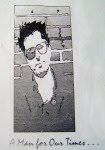Interesting Googling...
At music recording and production website, Gearslutz.com, there is usually a ban in the Music Computers forum on Mac v. PC discussions. It's been in place as long as I've been going there, and, by and large, I've come to the conclusion that it's a good idea.
But, as a sort of seasonal present to the scrappy and contentious among Gearslutz denizens, the powers that be there started what they titled: the ultimate Mac vs. PC slam death fest.
It's overall been great fun. Loads of humor, most of it more or less good-natured. But, after over 400 separate posts, and like all wonderful, but ephemeral things... it's winding down. A few straggling arguments have drifted somewhat lazily across the last page or two, including some sort of contention about market share that has seen both sides, with refreshing sheepishness, citing Google ranking/listings as admittedly speculative evidence.
That got me to thinking it was time for me to hall out the Sucks Index.
In the simplest form of the Sucks Index, one Googles mac sucks and windows Sucks and draws whatever conclusions one might try to gin up. Ludicrous mathematical constructions involving market share are allowed. Since it's meaningless, anyway. (But for those counting nonetheless: about 1,190,000 for mac sucks.; about 2,000,000 for windows sucks. Make of that what you will. BTW, it's the same with or without capitalization.)
But, unsatisfied with the limited knowledge that raw data provided -- you don't even know who is saying what, maybe it's Windows supremacists accounting for the much higher than marketshare-warranted numbers for mac sucks -- I decided to both drill in a little -- and to make things more interesting.
Check out these Google search results (about an hour or so old as I write this), testing on exact phrases (quotation-mark-delimited):
I was blown away. Clearly, anyone saying I hate my Mac is a Mac owner (or possibly some sort of lying agent-provocateur --no doubt there are some folks who falsely claim to own a given this or that in order to diss it with greater implied authority).
And, just as clearly, someone saying "I hate Windows" could be a Windows user or former user or a Mac partisan. (The PC thing is trickier still, I just threw it in to see what would happen.)
Thought provoking, huh?
But, as a sort of seasonal present to the scrappy and contentious among Gearslutz denizens, the powers that be there started what they titled: the ultimate Mac vs. PC slam death fest.
It's overall been great fun. Loads of humor, most of it more or less good-natured. But, after over 400 separate posts, and like all wonderful, but ephemeral things... it's winding down. A few straggling arguments have drifted somewhat lazily across the last page or two, including some sort of contention about market share that has seen both sides, with refreshing sheepishness, citing Google ranking/listings as admittedly speculative evidence.
That got me to thinking it was time for me to hall out the Sucks Index.
In the simplest form of the Sucks Index, one Googles mac sucks and windows Sucks and draws whatever conclusions one might try to gin up. Ludicrous mathematical constructions involving market share are allowed. Since it's meaningless, anyway. (But for those counting nonetheless: about 1,190,000 for mac sucks.; about 2,000,000 for windows sucks. Make of that what you will. BTW, it's the same with or without capitalization.)
But, unsatisfied with the limited knowledge that raw data provided -- you don't even know who is saying what, maybe it's Windows supremacists accounting for the much higher than marketshare-warranted numbers for mac sucks -- I decided to both drill in a little -- and to make things more interesting.
Check out these Google search results (about an hour or so old as I write this), testing on exact phrases (quotation-mark-delimited):
about 659,000 for "I hate my mac"
about 504,000 for "I hate windows"
about 188,000 for "I hate my PC"
I was blown away. Clearly, anyone saying I hate my Mac is a Mac owner (or possibly some sort of lying agent-provocateur --no doubt there are some folks who falsely claim to own a given this or that in order to diss it with greater implied authority).
And, just as clearly, someone saying "I hate Windows" could be a Windows user or former user or a Mac partisan. (The PC thing is trickier still, I just threw it in to see what would happen.)
Thought provoking, huh?


